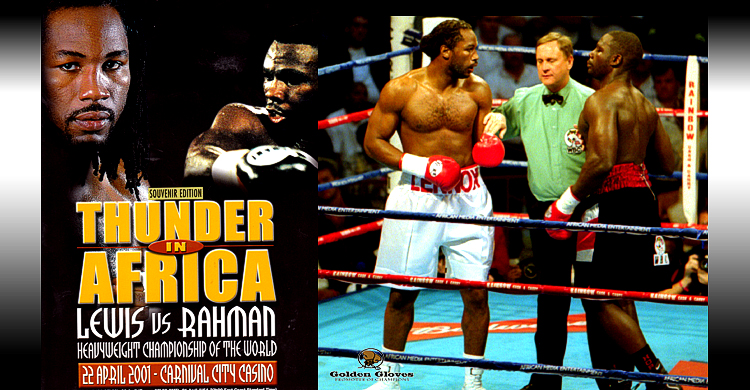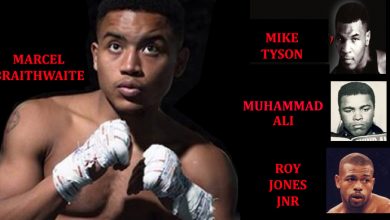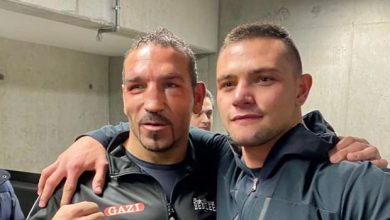Hasim Rahman KO 5 Lennox Lewis – 22 April 2001

The fourth major world heavyweight title fight on African soil (the others being Ali-Foreman, Coetzee-Tate and Weaver-Coetzee) took place at Carnival City in the early hours of the morning when the great Lennox Lewis defended his title against the American challenger, Hasim “The Rock” Rahman. What seemed to be a routine title defense for Lewis didn’t disappoint when those lucky enough to be ringside got to witness a dramatic upset.
“I suspect the reason the fight landed up here was because it wasn’t considered an easy sell for the American market,” says promoter Rodney Berman who promoted the card along with his American partner, Cedric Kushner. There were also numerous challenges involved in putting the fight on in South Africa. “Firstly, there was the time issue. We had to start the card at midnight so that the main event would come on around 4 am for American TV, which was HBO. Then there was money. HBO paid the fighters’ purses, but we had massive travel and hotel bills to take care of for the fighters, their camps and officials. The air fare alone was astronomical. Lewis was a big star and they were used to a certain standard that had to be met. Wages and insurance for the event were also sky high. Ringside tickets were around R5 000 to try and recoup some of the costs. Then HBO also had all kinds of demands on what the undercard must be like (Lehlohonolo Ledwaba successfully defended his IBF junior featherweight world title against Carlos Contreras in the main supporting bout) and a stacked undercard also had a price tag.”
There was some unexpected moral support, though. “I was having an interview with someone and my son came to me and said that there was a phone call for me. I told him that I would call them back, but he begged me to take the call, so I did.” It was former president, Nelson Mandela calling from Maputo. “There was a lot of negativity in the country about various things at that time but with this event the papers were full of Lewis-Rahman. President Mandela expressed his support, saying how proud he was that South Africa was able to stage such a massive fight and how positive it was for the country.”
Lennox Lewis was fresh off a wide points win over hard hitting David Tua, having made nine successful title defenses in his second reign as champion, during which he also became undisputed champion by beating Evander Holyfield.
Hasim Rahman, in contrast, was considered a bit of an in-and-outer. As a top prospect he suffered his first loss when David Tua stopped him somewhat controversially after he was ahead on points. He was also ahead on points when he suffered his second loss, Oleg Maskaev knocking him out of the ring in the eighth round. He rebounded well though, coming back from the brink of being knocked out again by stopping our own Corrie Sanders in an exciting fight which landed him the title shot.
With 28 knockouts in his 34 wins Rahman could hit, had heart and a solid jab, that much was obvious, but he was a notch below the very top of the division and not considered a serious threat to the Brit. Lewis, nicknamed “The Lion,” was expected to ultimately devour Rahman.
Although he didn’t think that Rahman would win, Berman had an inkling that Rahman might be tougher than expected. “Lennox had just been in a movie (Oceans Eleven) and was very casual in his approach. Rahman came to South Africa early and I said that I thought he might be dangerous. Lewis and his people didn’t like what I said at the time, but we are on good terms today,” chuckles Berman.
The event, dubbed “Thunder in Africa,” went ahead in the early hours of the morning and as expected, lightning struck but not quite the way most thought it would.
Entering the fifth round of their fight, Lewis was two points ahead on all three cards and to the casual observer seemed to be in control. Rahman however was edging closer every round, jabbing to the chest of Lewis, and landing a shot of his own every now and then. His life altering moment finally came when he backed Lewis to the ropes, Lewis tried to turn off the ropes and Rahman uncorked a peach of a right that nailed Lewis square on the jaw as he was bouncing off the ropes.
He collapsed on the canvass and could not beat the count. Hasim Rahman became the Buster Douglas of the new millennium as he celebrated wildly with his corner, which included the late Nick Durandt.
Like many before him who became champions by scoring big upsets, it did not last long for Rahman. They had a rematch in Las Vegas in November that year and this time Lewis delivered a career best performance, knocking Rahman flat on his back with a one-two in the fourth round, sending him skidding across the canvass where he remained for the count.
Rahman remained a fixture on the heavyweight scene for quite some time after that. He lost a technical decision to Evander Holyfield, was considered slightly unlucky to get a draw with David Tua in a rematch and lost a decision to John Ruiz in a challenge for the WBA title but managed to win the vacant WBC world title with a decision over Monte Barrett when Vitali Klitschko retired for the first time. He hung on to it with a draw against James Toney before losing it to his old foe, Oleg Maskaev. He would challenge for the title once more, getting stopped in seven rounds by Wladimir Klitschko before eventually retiring in 2014.
Lewis fought twice more. He stopped Mike Tyson in eight rounds and then, trailing on the cards in an all-out war, sliced open Vitali Klitschko to score a sixth-round stoppage in 2003. Lewis wisely decided to walk away with a 42-2-1 record which included 32 knockouts, having beaten every man he faced and considered by most the best big man of his era.
This would not be the last time that Golden Gloves would be involved in a massive upset in a world heavyweight title fight. There would be a WBO world heavyweight title fight in a couple of years in Germany featuring one Wladimir Klitschko, but more about that later..




